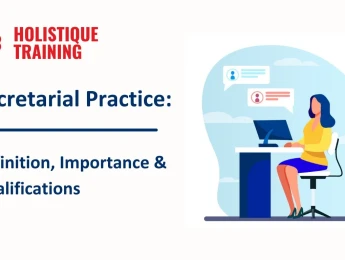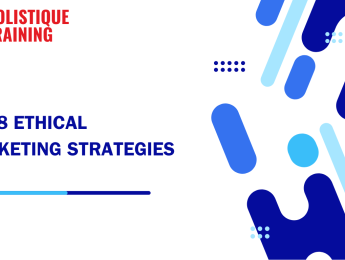- Table of Contents
- Introduction
- What is Secretarial Practice?
- Why is Secretarial Practice Important?
- Efficiency in Operations:
- Coordination and Communication:
- Compliance and Record-Keeping:
- Support to Management:
- Qualifications to Become a Secretary
- Education:
- Office Management Skills:
- Good Language Skills:
- General Knowledge:
- Good Communication Skills:
- Knowledge of Meetings:
- Computer Knowledge:
- Good Personality:
- Types of Secretaries and Their Duties
- Executive Secretary
- Legal Secretary
- Medical Secretary
- Administrative Secretary
- Corporate Secretary
- Personal Secretary
- Top Secretarial Skills in the Workplace
- Organisational SkillsOrganisational skills are fundamental for a secretary as they simultaneously manage multiple tasks and responsibilities. This includes keeping track of appointments, deadlines, and documents, which requires a methodical approach to ensure everything is in its proper place. Effective organisation helps maintain a clutter-free workspace and allows for quick information retrieval, enhancing overall efficiency and productivity.
- Communication Skills
- Time Management
- Attention to Detail
- Technical Proficiency
- Problem-Solving Abilities
- Confidentiality
- Adaptability
- Tools That Help with the Success of a Secretary
- Office Suite Software
- Project Management Tools
- Document Management Systems
- Calendar and Scheduling Tools
- Note-Taking Apps
- Customer Relationship Management (CRM) Software
- Time-Tracking Software
- Communication Platforms
- Salary of a Secretary
- Conclusion
Introduction
In modern business, secretarial practice is the backbone supporting the smooth functioning of organisations. Secretaries are more than just administrative assistants; they are key players who ensure seamless communication flows, schedules are managed efficiently, and office operations are conducted without a hitch. Understanding the intricacies of secretarial practice—ranging from the essential qualifications to the various types of secretarial roles—can shed light on the significant impact these professionals have on organisational success. This blog post explores the fundamental aspects of secretarial practice, highlighting the skills, tools, and certifications that can pave the way for a successful career in this vital field.
What is Secretarial Practice?
Secretarial practice refers to the set of tasks and duties performed by a secretary to support an organisation's administrative and managerial functions. It involves managing office duties such as preparing reports, organising meetings, handling correspondence, maintaining records, and ensuring compliance with legal and procedural requirements. Secretarial practice is the art of managing information, communication, and various clerical tasks to enable an organisation to operate smoothly and effectively.
At its core, secretarial practice is about being the custodian of the office's administrative processes. This practice requires a blend of organisational skills, attention to detail, and a deep understanding of the specific industry’s legal and procedural frameworks. Secretarial practice forms the bedrock of efficient and effective management, whether in a corporate setting, a legal firm, or a government office.
Why is Secretarial Practice Important?
Secretarial practice is vital because it ensures the smooth functioning of an organisation's day-to-day operations. A secretary acts as the gatekeeper and facilitator, managing the flow of information and ensuring that executives, managers, and employees have what they need to perform their duties effectively.
Efficiency in Operations:
By handling administrative tasks, secretaries free up time for executives and managers, allowing them to focus on more strategic aspects of their roles. This division of labour enhances the overall efficiency of the organisation. Secretaries streamline workflows, reduce bottlenecks, and ensure that processes run smoothly, leading to increased productivity and a more organised work environment.
Coordination and Communication:
Secretaries are often the primary point of contact within an organisation. They facilitate communication between departments, ensure accurate messages are conveyed, and manage scheduling meetings, conferences, and appointments. This role is crucial in preventing miscommunications and ensuring that all team members are aligned, which helps achieve organisational goals more effectively.
Compliance and Record-Keeping:
Secretaries maintain records and ensure the organisation meets legal and procedural requirements. This aspect of secretarial practice is crucial for avoiding legal issues and maintaining the integrity of the organisation's operations. Proper record-keeping and adherence to regulatory standards safeguard the organisation from potential legal risks and enhance its credibility and operational transparency.
Support to Management:
A secretary provides essential support to management by organising information, preparing reports, and managing correspondence. This support allows managers to make informed decisions and ensures the organisation's objectives are met. By handling routine tasks and managing critical documents, secretaries enable managers to concentrate on strategic decision-making and leadership responsibilities, thereby enhancing overall organisational effectiveness.
Qualifications to Become a Secretary
Becoming a successful secretary requires a combination of formal education, practical skills, and certain personal attributes. Below are the key qualifications and qualities that aspiring secretaries should possess:
Education:
A basic educational requirement for secretaries is typically a high school diploma or equivalent. However, many employers prefer candidates with post-secondary education in office administration, business management, or a related field. Specialised courses in secretarial practice or office management are highly advantageous. Advanced education, such as an associate's or bachelor's degree in business administration, can further enhance a secretary's career prospects and open doors to higher-level positions. Earning additional certifications also adds an edge to someone’s likelihood to get hired. Here are some certifications you can aim to get:
Certified Administrative Professional (CAP):
Offered by the International Association of Administrative Professionals (IAAP), theCAP certification is widely recognised and demonstrates a high level of expertise in administrative tasks, office management, and professional skills. It covers areas such as organisational communication, technology, and business writing.
Microsoft Office Specialist (MOS):
This certification, provided by Microsoft, validates proficiency in using Microsoft Office applications, which are essential tools for secretaries. It includes certifications for various Office programs such as Word, Excel, and PowerPoint, proving the ability to utilise these tools in a professional setting effectively.
Office Management Skills:
Secretaries must be proficient in office management. This includes understanding office procedures, managing schedules, handling correspondence, and maintaining records. Strong organisational skills are essential to managing multiple tasks effectively. Additionally, familiarity with office workflows, such as filing systems and inventory management, contributes to a more efficient office environment. Experience with office management software and tools can further streamline these processes.
Good Language Skills:
Secretaries must have excellent language skills, including written and spoken communication proficiency. This skill is necessary for drafting letters, preparing reports, and communicating effectively with clients, colleagues, and superiors. Strong language skills also aid in proofreading and editing documents to ensure clarity and professionalism, which is critical in maintaining the organisation’s image.
General Knowledge:
A well-rounded general knowledge base helps secretaries understand the context of their work. This includes knowledge of current affairs, industry-specific trends, and the general workings of the business environment. Awareness of broader economic and technological developments can also inform better decision-making and improve the organisation's ability to handle diverse tasks.
Good Communication Skills:
Effective communication is at the heart of secretarial practice. Secretaries must convey information clearly through emails, phone calls, or face-to-face interactions. They must also be adept at listening and interpreting information accurately to ensure that messages are delivered correctly and that feedback is appropriately acted upon.
Knowledge of Meetings:
Understanding the legal requirements and procedures related to meetings, such as preparing agendas, taking minutes, and ensuring compliance with corporate governance practices, is essential for secretaries, particularly in corporate and legal settings. Knowledge of these procedures helps maintain accurate records and ensure that meetings are conducted in accordance with organisational policies and legal requirements.
Computer Knowledge:
In the digital age, secretaries must proficiently use computers and office software. This includes word processing, spreadsheets, presentation software, and email management. Familiarity with office management systems and databases is also important. Advanced computer skills, such as using data analytics tools or project management software, can further enhance a secretary's efficiency and effectiveness.
Good Personality:
A secretary's demeanour can significantly impact the work environment. A pleasant personality, combined with professionalism and a strong work ethic, can enhance relationships within the office and contribute to a positive organisational culture. Traits such as reliability, empathy, and a proactive attitude are valuable in building rapport with colleagues and clients, and in handling challenging situations with grace.
Types of Secretaries and Their Duties
Secretarial roles can vary significantly depending on the type of organisation, industry, and specific job requirements. Each type of secretary has specialised responsibilities tailored to their environment. Below are some common types of secretaries and the duties associated with each role:
Executive Secretary
Duties:
- Administrative Support: Executive secretaries provide high-level administrative support to top executives, such as CEOs and Presidents. They manage the executive’s schedule, arrange meetings, and coordinate travel plans.
- Communication Management: They handle confidential correspondence and liaise between the executive and other stakeholders, including clients, employees, and board members.
- Document Preparation: Executive secretaries prepare reports, presentations, and other high-level documents, ensuring accuracy and professionalism.
- Decision-Making Support: They assist with strategic planning by preparing briefing materials and compiling necessary information for executive decisions.
Skills:
- Exceptional organisational skills
- High level of discretion and confidentiality
- Advanced communication and interpersonal skills
Legal Secretary
Duties:
- Legal Documentation: Legal secretaries prepare, proofread, and file legal documents, including briefs, motions, and legal correspondence.
- Client Interaction: They manage client communications, schedule consultations, and ensure that clients are kept informed about their cases.
- Court Procedures: They assist with the preparation of cases for court by organising evidence, filing legal papers, and ensuring compliance with court rules and deadlines.
- Case Management: Legal secretaries maintain case files, track case progress, and assist attorneys with legal research.
Skills:
- Knowledge of legal terminology and procedures
- Strong attention to detail
- Ability to handle sensitive information with confidentiality
Medical Secretary
Duties:
- Medical Records Management: Medical secretaries handle patient records, ensuring that they are accurate, up-to-date, and compliant with healthcare regulations.
- Appointment Scheduling: They manage patient appointments, coordinate referrals, and handle insurance claims and billing.
- Medical Transcription: They transcribe medical dictations and maintain detailed notes on patient interactions and treatments.
- Patient Interaction: Medical secretaries interact with patients, providing information about procedures, answering questions, and managing patient intake.
Skills:
- Knowledge of medical terminology and healthcare procedures
- Familiarity with medical billing and coding
- Excellent organisational and multitasking abilities
Administrative Secretary
Duties:
- General Office Management: Administrative secretaries manage day-to-day office operations, including filing, data entry, and handling office supplies.
- Scheduling and Coordination: They coordinate meetings, arrange travel, and handle correspondence for multiple departments or teams.
- Customer Service: Administrative secretaries often serve as the first point of contact for clients and visitors, addressing inquiries and providing information.
- Report Generation: They prepare reports and documents, manage projects, and support various office functions.
Skills:
- Strong organisational and time-management skills
- Proficiency in office software and equipment
- Effective communication and problem-solving abilities
Secretary Type | Primary Role | Work Environment | Skills Required | Common Tasks | Typical Employers |
Executive Secretary | Support top executives | Corporate offices | Discretion, management | Scheduling, communication | Large corporations |
Legal Secretary | Assist lawyers | Law firms, courts | Legal terminology, typing | Document preparation, filiing | Law firms, courts |
Medical Secretary | Manage healthcare admin | Hospitals, clinics | Medical terminology, empathy | Patient records, billing | Hospitals, medical practices |
School Secretary | Support educational staff | Schools, universities | Organisation, communication | Attendance, admin tasks | Schools, educational institutions |
Virtual Secretary | Remote administrative aid | Home office, remote | Tech-savvy, communication | Email management, scheduling | Various, freelancers |
Corporate Secretary
Duties:
- Governance and Compliance: Corporate secretaries ensure that the company meets legal and regulatory requirements. They prepare documentation for board meetings, manage shareholder communications, and ensure compliance with corporate governance practices.
- Meeting Coordination: They organise and manage board meetings, including preparing agendas, taking minutes, and following up on action items.
- Record Keeping: Corporate secretaries maintain corporate records, such as meeting minutes, company bylaws, and shareholder registers.
- Liaison Role: They act as a liaison between the board of directors and the company’s management, facilitating communication and ensuring that corporate policies are followed.
Skills:
- Knowledge of corporate law and governance
- Strong organisational and record-keeping skills
- Ability to handle complex and sensitive information
Personal Secretary
Duties:
- Personal Assistance: Personal secretaries provide support with personal tasks for executives or high-profile individuals, including managing personal appointments, handling personal correspondence, and organising personal events.
- Travel and Event Planning: They arrange personal travel plans, accommodations, and coordinate personal events or functions.
- Administrative Support: Personal secretaries may also assist with general administrative tasks, such as managing household staff or handling personal finances.
Skills:
- High level of trustworthiness and discretion
- Strong organisational and multitasking abilities
- Ability to handle both professional and personal tasks efficiently
Each type of secretary plays a crucial role in ensuring that their specific area of responsibility runs smoothly. Their specialised skills and knowledge enable them to handle various tasks effectively, contributing to their respective organisations' overall success and efficiency.
Top Secretarial Skills in the Workplace
Secretarial roles require a diverse skill set that goes beyond basic administrative duties. Here are some of the top skills that are essential for success in the workplace:
Organisational Skills
Organisational skills are fundamental for a secretary as they simultaneously manage multiple tasks and responsibilities. This includes keeping track of appointments, deadlines, and documents, which requires a methodical approach to ensure everything is in its proper place. Effective organisation helps maintain a clutter-free workspace and allows for quick information retrieval, enhancing overall efficiency and productivity.
Communication Skills
Strong communication skills are essential for secretaries who frequently interact with clients, colleagues, and executives. This involves clear and concise written communication, such as drafting emails and reports, and effective verbal communication during meetings and phone calls. Excellent communication skills help accurately convey information, resolve misunderstandings, and build positive relationships within the workplace.
Time Management
Time management is crucial for secretaries who must balance numerous tasks and prioritise effectively to meet deadlines. This skill involves creating schedules, setting priorities, and managing time efficiently to ensure all tasks are completed on time. Good time management reduces stress and prevents last-minute rushes, allowing secretaries to handle their responsibilities smoothly and effectively.
Attention to Detail
Attention to detail is vital for secretaries who handle important documents and data that must be accurate and error-free. This skill involves careful review of correspondence, reports, and data entries to ensure all information is correct and complete. Attention to detail helps avoid costly mistakes, maintain the quality of work, and ensure that all tasks are performed with precision.
Technical Proficiency
Technical proficiency encompasses the ability to use office software and technology effectively. Secretaries must be adept with word processing programs, spreadsheets, email systems, and other office applications. Being technologically skilled also involves staying updated with new software and tools to enhance productivity and streamline administrative tasks.
Problem-Solving Abilities
Problem-solving abilities are important for secretaries who often encounter unexpected challenges or issues that require quick and effective solutions. This skill involves analysing problems, considering potential solutions, and making decisions that resolve issues efficiently. Strong problem-solving skills enable secretaries to handle disruptions smoothly and maintain operational continuity in the workplace.
Confidentiality
Confidentiality is critical for secretaries who often handle sensitive information and documents. This involves understanding the importance of securing private data and maintaining discretion in all communications. Upholding confidentiality helps build trust with colleagues and clients and protects sensitive information from unauthorised access.
Adaptability
Adaptability is essential for secretaries who must adjust to changing priorities, new tasks, and evolving office environments. This skill involves being flexible and open to new methods or technologies that can improve efficiency. Adaptability allows secretaries to handle various responsibilities and work effectively under different conditions, contributing to a more dynamic and responsive workplace.
Key Performance Indicator (KPI) | Description |
Timeliness of Task Completion | Percentage of tasks completed within deadlines. |
Accuracy of Documentation | Number of errors found in official documents. |
Meeting Coordination Efficiency | Success rate of meetings scheduled without conflicts. |
Response Time to Inquiries | Average time taken to respond to emails/calls. |
Confidentiality Maintenance | Instances of confidentiality breaches reported. |
Table: KPIs of a secretary
Tools That Help with the Success of a Secretary
To excel in their roles, secretaries rely on a variety of tools that help them manage their tasks efficiently. These tools range from traditional office supplies to advanced software applications:
Office Suite Software
Office suite software, such as Microsoft Office (Word, Excel, PowerPoint) and Google Workspace (Docs, Sheets, Slides), is fundamental for secretaries. These tools facilitate the creation of documents, spreadsheets, and presentations, enabling secretaries to draft reports, manage data, and prepare materials for meetings. Proficiency in these applications enhances productivity and ensures that all office tasks are performed efficiently and professionally.
Project Management Tools
Project management tools help secretaries organise and track various projects and tasks. These tools allow for creating task lists, assignment deadlines, and monitoring progress, which is crucial for managing multiple responsibilities. By using project management tools, secretaries can keep projects on track, ensure timely completion, and coordinate efforts among team members effectively.
Document Management Systems
Document management systems, such as Dropbox, Google Drive, and SharePoint, are essential for organising and storing documents securely. These systems provide version control, access permissions, and collaborative editing features, which help maintain accurate records and streamline document sharing. Efficient use of document management systems reduces the risk of lost or misplaced files and ensures that important documents are easily accessible.
Calendar and Scheduling Tools
Calendar and scheduling tools like Google Calendar, Outlook Calendar, and Doodle are vital for managing appointments and meetings. These tools enable secretaries to schedule and coordinate meetings, send invitations, and avoid conflicts. Integrated features, such as reminders and automated scheduling, help secretaries keep track of important dates and manage their time effectively.
Note-Taking Apps
Note-taking apps such as Evernote, OneNote, and Notion are valuable for capturing and organising information. These apps allow secretaries to take meeting notes, create task lists, and store ideas in an organised manner. The ability to easily search and access notes enhances efficiency and ensures that important information is readily available when needed.
Customer Relationship Management (CRM) Software
CRM software like Salesforce, HubSpot, and Zoho CRM is crucial for managing client interactions and maintaining customer records. These tools help secretaries track communications, manage client information, and streamline customer service processes. Effective use of CRM software improves relationship management and ensures that client interactions are handled professionally and efficiently.
Time-Tracking Software
Time-tracking software such as Toggl, Harvest, and Clockify is useful for monitoring how time is spent on various tasks. These tools provide insights into time allocation and productivity, helping secretaries manage their workload more effectively. By analysing time-tracking data, secretaries can identify areas for improvement and optimise their work processes to enhance efficiency.
Communication Platforms
Communication platforms like Slack, Microsoft Teams, and Zoom are essential for facilitating collaboration and communication within the workplace. These tools support instant messaging, video conferencing, and file sharing, which are crucial for remote and in-office teams. Effective use of communication platforms ensures that information is exchanged smoothly and that team members stay connected, regardless of their physical location.
Salary of a Secretary
A secretary's salary can vary significantly depending on factors such as the type of organisation, location, level of experience, and specific responsibilities. Below is an overview of the factors influencing a secretary's salary:
- Experience: As with most professions, experience plays a significant role in determining a secretary's salary. Entry-level secretaries typically earn less than those with several years of experience. Experience brings a higher level of responsibility and, consequently, higher pay.
- Type of Organisation: The industry and size of the organisation also impact salary. Secretaries working in large corporations, legal firms, or government agencies often earn more than those in smaller companies or non-profit organisations. Specialised secretaries, such as legal or medical secretaries, tend to have higher salaries due to the specialised knowledge required.
- Location: Geographic location is another key factor. Secretaries in metropolitan areas or regions with a higher cost of living generally earn more than those in rural areas or regions with a lower cost of living.
- Education and Certifications: Additional qualifications, such as a degree in office administration or certifications in specialised areas, can lead to higher salaries. Employers often value secretaries who have invested in their professional development and possess advanced skills.
- Duties and Responsibilities: The scope of duties and responsibilities assigned to a secretary also affects their salary. Secretaries who take on additional roles, such as project management or executive support, may receive higher compensation.
- Average Salary: According to data from Zip Recruiter, the average salary for secretaries in the United States is $45,945 per year. However, executive secretaries and those in specialised roles can earn upwards of $60,000 or more annually. In other countries, salaries vary widely based on the local economy, cost of living, and industry standards.
Conclusion
Secretarial practice is an essential component of organisational success. It involves a diverse range of tasks, from managing communication and schedules to ensuring compliance with legal and procedural requirements. The role of a secretary, often underestimated, is crucial for the efficient operation of any organisation. By understanding the importance of secretarial practice, the qualifications needed, and the various types of secretarial roles, one can appreciate the vital contribution secretaries make to the workplace.
In today's fast-paced and ever-evolving work environment, secretaries must possess a wide range of skills, from time management and communication to technical proficiency and adaptability. The tools they use, from office software to project management applications, enable them to perform their duties with precision and efficiency.
For those aspiring to excel in this dynamic field, our "Personal Assistant & Secretarial Training" course offers comprehensive training designed to equip you with the skills and knowledge necessary to thrive. Enhance your expertise and prepare for a successful career with our expert-led program tailored to meet the demands of modern secretarial roles.

























